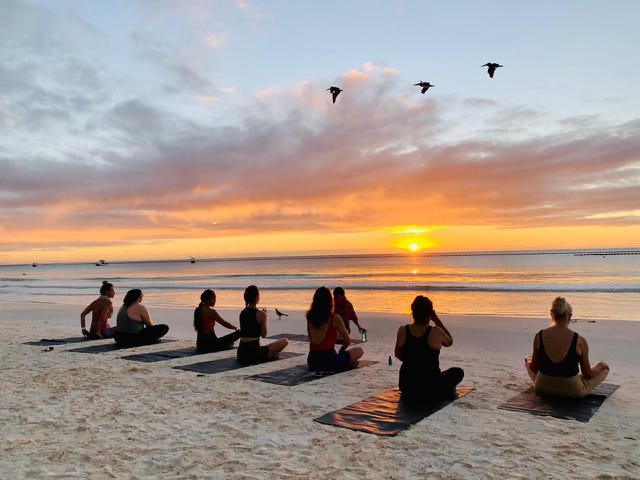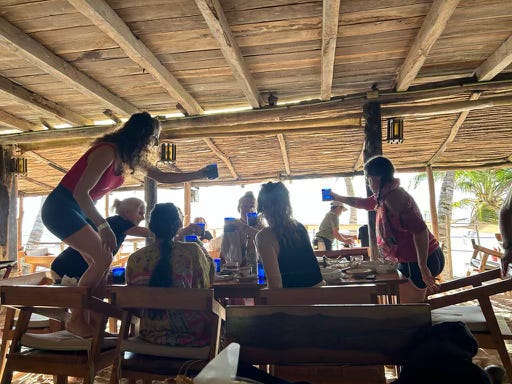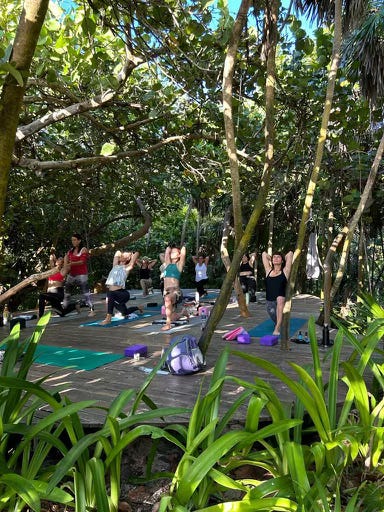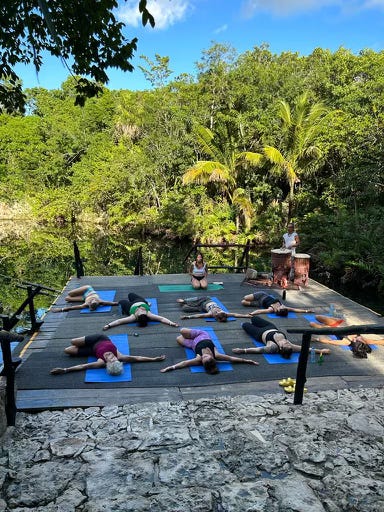Are you an illuminator or a diminisher?
An invitation to examine ourselves + our closest friends and family and determine if they shape how we feel, act, and think
I’m on a high from spending time with 10 women on a yoga retreat. Some of them I knew, most of them I did not. We ate breakfast, lunch and dinner by the Caribbean Sea with our feet in powder-soft sand, slapped mosquitos on our sun-kissed skin, drank hibiscus tea, and talked about very real life obstacles. I listened to and participated in stories about suicide, cancer, chronic illness, race, privilege, complex relationships with our spouses, fears about screwing up our kids, aging and female adulthood.
All these women were illuminators. I know we all have diminishing tendencies but we came to this place to illuminate the light inside of us and with others in the group.
As we gather with friends and family more over the next months during the holiday season, I invite you to think about those you surround yourself and their affect on you.
Which one are you, an illuminator? Or a diminisher? And what the heck do these two words mean?
The New York Times opinion writer David Brooks wrote a book over the course of 4 years to better understand how to know others more deeply in an attempt to find out how to make others feel respected and understood. I love this premise.
In his research, he made an observation:
I’ve noticed along the way that some people are much better at seeing people than others are. In any collection of humans, there are diminishers and there are illuminators. Diminishers are so into themselves, they make others feel insignificant. They stereotype and label. If they learn one thing about you, they proceed to make a series of assumptions about who you must be.
Illuminators, on the other hand, have a persistent curiosity about other people. They have been trained or have trained themselves in the craft of understanding others. They know how to ask the right questions at the right times — so that they can see things, at least a bit, from another’s point of view. They shine the brightness of their care on people and make them feel bigger, respected, lit up.
I have been thinking about this distinction. Which one am I? I’d like to believe I’m more of an illuminator, which I think is true today and I sure hope I keep this curiosity going as I age. I also think I used to be more of a diminisher, which I don’t like to admit. Perhaps I was young, ignorant, or lacked self confidence. Some of us are raised a certain way, taught to label others. Gossiping was also a thing in my teens and 20s. I used to work alongside colleagues who operated with Mean Girl values and it infiltrated my thoughts.
When my depression got very dark, it was hard for those who never experienced something like it to understand what I was going through. Maybe this was when I decided that I don’t need to agree or fully understand what someone is going through to know that their experience is valid. What someone is going through is their own truth and reality. I can ask more questions, truly listen, and hear how they came to believe what they do. This practice deepened over the last year with my podcast and I’m grateful for this opportunity.
As I have a desire to feel seen, I cannot expect this outcome from others if I don’t allow the space to see others more deeply.
Which one are you? Who are the top 10 people you speak to, spend time with, or work alongside? I don’t think it matters if they are illuminators or diminishers. Think how they shape you, make you feel, and allow you to think. With this awareness, maybe you can simply observe. Or maybe it’s an invitation to shake things up with your relationships. Knowing this distinction, think about how you want to spend time with them next time.
According to Brooks’ book, How to Know a Person (I just started it and have learned so much already), being an illuminator takes skill and practice. We can all learn to be illuminators if we are open to doing the work. We must train ourselves, learn the craft, and apply it. It’s about being generous, listening with curiosity, being open to the experiences of others, resisting the urge to see only a piece of someone for who they are and, instead, appreciating them as holistic people.
A special shout out to my pen pal I’ve never met in real life, and Substack writer
, who recently wrote about Henry Winkler, the man who played Arthur Fonzarelli, “The Fonz” on Happy Days. I personally also enjoyed his later work as possibly the world’s worst lawyer, Barry Zuckercorn on Arrested Development.Hilary’s piece describes the time she met Mr. Winkler, who took the time to sit down and meet with fans, a gesture he didn’t have to do but did anyway. I recommend you read her piece, which describes his learning disability as a child, his parents calling him a dumb dog, and how, when he went into acting, “He struggled to learn lines, for which he was roundly mocked, but he was undeterred. ‘I live by two words,’ Winkler states. ‘Tenacity and gratitude. I was extremely single-minded.’
She described Henry Winkler as an illuminator.
I recommend you read Hilary’s post + David Brooks’ article on illuminators/diminishers and understand “the skills illuminators possess, the ones that are essential for seeing people well.”
P.S. Here’s to letting go of expectations. Last week I didn’t post my usual Friday newsletter. Happy to be back.
P.P.S. here’s my next edition of…
Substack Reads: Rising Writers
This is a play on Substack Reads — a curated list of Substack articles I enjoy. My version includes authors with smaller subscriber numbers (in the hundreds).
Fellow writers!
wrote a very helpful piece on pitching your work to publications. I am a former PR professional and I agree with her experience! wrote a piece a few months ago on her son’s suicide. I think this is an important read to learn about one perspective (unfortunately, of many) about the second leading cause of death for young people. She has a perspective that could open our minds about this epidemic, starting with shifting our language: “These days the verb ‘committed’ is not the preferred terminology for suicide; I think it’s obvious why, but just in case, it’s because “committed” is associated with a crime. And In my view it should not be a crime for someone to end their unbearable suffering.”











Such a beautiful post, Stephanie and your retreat looks like a dream. Thrilled for you! And thank you so much for the very kind words and shout out. You're totally an illuminator with a generous heart. ❤️ Very grateful to have connected with you and look forward to an IRL meet up some day. I need to read Brooks' book! I wonder if he says anything about learning to illuminate more as we age. It seems that when we're young, we're still trying so hard to figure out who we are that we're less likely to take a minute and put a spotlight on someone else. Perhaps as we age and grow more comfortable in our own skins, we slow down, and see all the bright beings around us? I'll have to read the book and find out. In his new book, David Sedaris says that when he was kid, he went to a book signing for one of his favorite authors and the author didn't even look up or acknowledge young David. So now, at his own book signings, Sedaris takes time to connect with every fan. He asks them questions and draws a little sketch in each book. I just went to see him live and he even had a box of chocolates on the table to offer to fans. I love that about him. ❤️
I recently listened to David Brooks on Kate Bowler’s podcast. He talked about this and the art of really getting to know (see) someone. For me, the older I get the less tolerance I have for small talk & gossip. I crave meaning - deeper conversations. I think that naturally brings us towards illuminating one another.
I enjoyed reading this, Stephanie! ✨